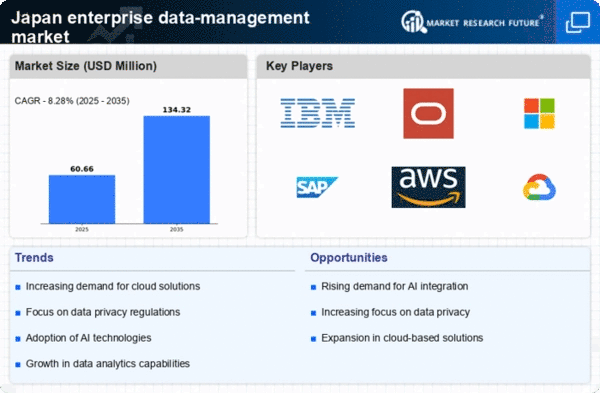Increased Focus on Data Quality
In the context of the enterprise data-management market in Japan, there is a growing emphasis on data quality. Organizations are beginning to understand that high-quality data is essential for effective decision-making and operational efficiency. Poor data quality can lead to significant financial losses and reputational damage. As a result, businesses are investing in data cleansing and validation tools to enhance the accuracy and reliability of their data. The market for data quality solutions is expected to grow by around 12% annually, driven by the need for organizations to maintain competitive advantages through reliable data. This focus on data quality is likely to influence the enterprise data-management market, prompting the development of solutions that prioritize data integrity and accuracy, ultimately leading to better business outcomes.
Regulatory Compliance Pressures
In Japan, the enterprise data-management market faces increasing pressures related to regulatory compliance. The introduction of stringent data protection laws, such as the Act on the Protection of Personal Information (APPI), compels organizations to adopt robust data management practices. Compliance with these regulations is not merely a legal obligation; it is also a critical factor in maintaining customer trust and brand reputation. As businesses navigate the complexities of data governance, the demand for enterprise data-management solutions that ensure compliance is likely to rise. This trend may lead to a projected market growth of around 15% annually as organizations invest in technologies that facilitate data tracking, reporting, and auditing. The emphasis on compliance is expected to shape the enterprise data-management market, driving innovation and the development of solutions tailored to meet regulatory requirements.
Rising Demand for Data Analytics
The enterprise data-management market in Japan experiences a notable surge in demand for data analytics solutions. Organizations are increasingly recognizing the value of data-driven decision-making, which is reflected in the projected growth of the analytics sector. By 2026, the analytics market in Japan is expected to reach approximately $3 billion, indicating a robust interest in leveraging data for strategic advantages. This trend is likely to drive investments in enterprise data-management systems that facilitate the collection, storage, and analysis of vast amounts of data. As businesses strive to enhance operational efficiency and customer engagement, the integration of advanced analytics into data management practices becomes essential. Consequently, the enterprise data-management market is poised for expansion as companies seek to harness the power of data analytics to gain insights and improve overall performance.
Emergence of Data-Driven Cultures
The enterprise data-management market in Japan is increasingly shaped by the emergence of data-driven cultures within organizations. Companies are recognizing the importance of fostering a culture that values data as a strategic asset. This cultural shift encourages employees at all levels to utilize data in their daily operations, leading to more informed decision-making and enhanced collaboration. As organizations invest in training and development programs to promote data literacy, the demand for enterprise data-management solutions that support this cultural transformation is likely to rise. The market may see a growth rate of approximately 10% annually as businesses seek to empower their workforce with the tools and knowledge necessary to leverage data effectively. This trend underscores the importance of integrating data management practices into the organizational fabric, ultimately driving the evolution of the enterprise data-management market.
Shift Towards Hybrid Data Environments
The enterprise data-management market in Japan is witnessing a significant shift towards hybrid data environments. Organizations are increasingly adopting a combination of on-premises and cloud-based solutions to optimize their data management strategies. This hybrid approach allows businesses to leverage the scalability and flexibility of cloud services while maintaining control over sensitive data stored on-premises. According to recent estimates, the hybrid cloud market in Japan is projected to grow by approximately 20% annually, reflecting a broader trend towards integrated data management solutions. As companies seek to balance performance, security, and cost-effectiveness, the enterprise data-management market is likely to evolve, offering innovative solutions that cater to the needs of hybrid environments. This shift may also encourage collaboration between traditional IT infrastructure and modern cloud technologies, fostering a more dynamic data management landscape.
















